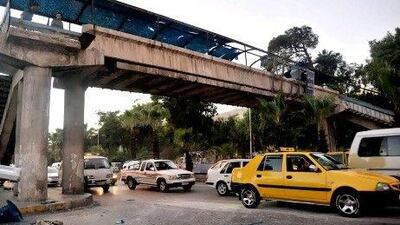DAMASCUS // By any standards it was not a quiet day in Damascus, and certainly not peaceful.
There were shootings, raids and arrests by security forces, at least one bombing, and helicopter gunships were in the air. Activists said 22 people were killed in the city and its suburbs.
Yet by the grim yardstick established over the past two months, Sunday counted as a day of relative calm, certainly for some southern districts of Damascus.
It was the first full day since mid-July that no artillery or mortar fire could be heard splitting the air. Gunfire, yes, but no explosions.
It is a sign of how far things have slipped, and how deep into conflict Damascus has drifted - despite the entirely superficial appearance in some central areas of all being well - that a single day without artillery fire has become noteworthy.
"I didn't hear a single explosion today, I can't remember the last time it was this quiet, enjoy it while it lasts," said a construction worker. He has a grandstand view of southern Damascus from the roof of a building on the edge of Daraya, where he pours cement and stacks bricks.
For the past two months the cityscape before him has routinely been scarred by tall columns of heavy black smoke, which have become as much a part of the Damascus skyline as its mosque minarets, disused tower cranes and famous Qasioun Mountain to the north.
Winds blowing in from Lebanon would brush the plumes away, only for them to reappear after the next artillery barrage.
On still, windless afternoons and evenings, a dark pall would hang ominously over Daraya, Qadam, Hajar Aswad, Nahar Aisha, Spaina, Yarmouk and Tadamum, all districts within the densely populated urban sprawl on the southern edge of Damascus that have suffered heavily.
Abu Hassan, a resident of Qadam, used the lull to go home for the first time since he and his family fled their home amid fierce street fighting and shelling a week before.
"The house was still there and nothing had been stolen," he said. "All the walls had holes smashed in them for use by snipers but I should be grateful that was the only damage."
Micro-buses, the mainstay of cheap, public transport in Damascus, wove through Qadam, mostly passing shuttered shops, although some had opened, selling cases of bottled water, cooking oil and large bags of rice and pasta for residents to stock up.
Most people keep emergency stores at home these days, enough food and water to see them through a week or two of not being able to leave the house.
Critical of the armed rebels fighting to topple the president, Bashar Al Assad, Abu Hassan nevertheless blames regime forces for dragging the country into an increasingly destructive war.
"In Qadam this all started off with peaceful demonstrations for freedom but the security forces killed a lot of unarmed protesters, then the Free Syrian Army came to protect the demonstrations and the next thing there was a siege and shelling from the regime," he said.
"It's one thing to have soldiers fighting but unforgivable to use artillery on a residential area, there are too many innocent casualties."
On the northern edge of Qadam, where it joins Midan, huge queues of people formed outside the gas distribution depot. Cooking gas is in scant supply and, despite the doors being shut, young men scaled the depot's high walls desperate to get canisters filled.
In Hajar Aswad, a particularly hard-hit area that has long had a reputation as a tough, working-class district where the genteel middle classes and elite do not set foot, some people also went to check on property and the well-being of friends
"Hajar has been smashed to pieces. It's a disaster. There were bodies in the side streets. It was worse than other areas I've been to," said an unemployed university graduate.
To the east and north of the capital, it was very much business as usual - mortars, some artillery fire.
In the southern suburbs, the tanks and troops were still on the streets, in the places they seem to have taken up permanent residence.
If anything, the often slapdash checkpoints were more fastidious that normal in checking identification and searching cars.
There seemed to be no real expectation that the comparative calm would be anything more than a temporary reprieve.
"The rebels need to take the capital and the regime will do anything to hold on to it," said Abu Hassan.
"It may be quiet today but we all know it won't be quiet for very long."

